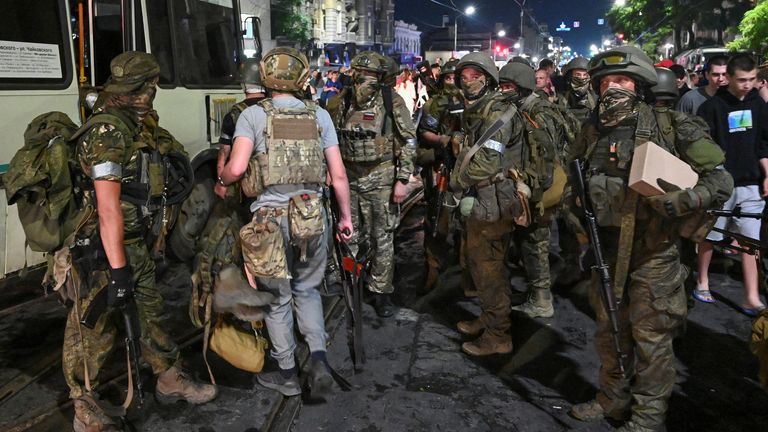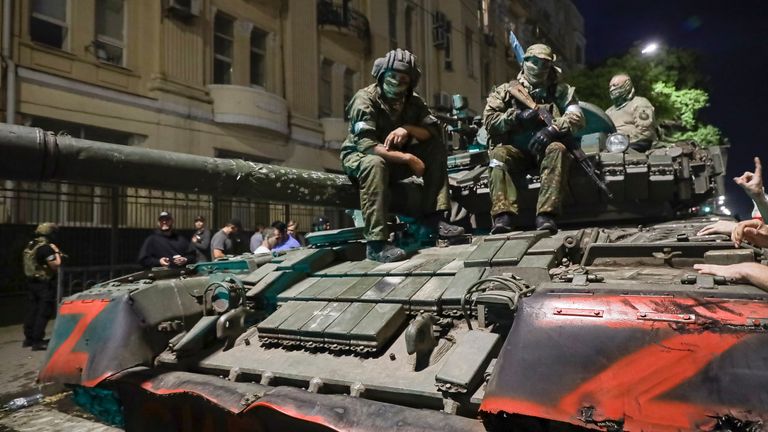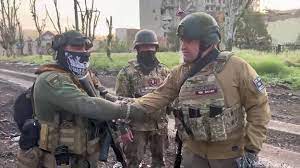*As mercenary boss Yevgeny Prigozhin relocates to Belarus
Some Wagner Group mercenaries will join the official Russian military after their leader called off their march on Moscow and agreed to relocate to Belarus.
Yevgeny Prigozhin stood down his troops, who were heading towards the Russian capital, saying he wished to avoid spilling Russian blood.
His mercenaries were reportedly just 120 miles from Moscow after Prigozhin had vowed to “destroy anyone who stands in our way.”
After negotiations with the Kremlin, Prigozhin, previously known as “Putin’s chef”, called an abrupt halt to the advance, which many observers had branded an attempted coup.
As part of the agreement, the full details of which are yet to be revealed, it was reportedly decided that Prigozhin will leave Russia for Belarus and some of his Wagner fighters will be subsumed into the Russian military. Image: Wagner troops reportedly advanced north to 120 miles (200km) from Moscow when their convoy turned back
Image: Wagner troops reportedly advanced north to 120 miles (200km) from Moscow when their convoy turned back
Presidential Spokesperson Dmitry Peskov told journalists that a part of the Wagner private military company’s troops, who decided against participating in an armed mutiny, will be able to sign contracts with the Russian Defense Ministry.
“An agreement was reached that PMC Wagner troops would return to their camps and places of deployment. Some of them, if they wish to do so, can later ink contracts with the Defense Ministry,” Peskov said. “It also applies to fighters, who decided against taking part in this ‘armed mutiny.’”
The Spokesperson also said “there were some fighters in the military formations [of Wagner PMC], who changed their minds at the very beginning [of the armed mutiny] and returned immediately.
“They have even requested the assistance of the traffic police as well as other help to return to their permanent places of deployment.”
On the evening of June 23, the Telegram channel of Wagner private military company founder Yevgeny Prigozhin posted several audio records with his statements, in which he claimed that strikes had allegedly been delivered against his formations and accused the country’s military leadership of that.
In the wake of this, the Federal Security Service (FSB) of Russia has opened a criminal case into a call for an armed mutiny. The FSB urged Wagner fighters not to obey Prigozhin’s orders and take measures for his detention.
Russia’s Defense Ministry dismissed as untrue the reports that Russian forces had allegedly delivered a strike against “the rear camps of the Wagner private military company.”
In his televised address to citizens on Saturday, Russian President Vladimir Putin called the actions by the Wagner private military company an armed mutiny and betrayal and assured that harsh measures would be taken against the insurgents.
But in his message calling off his “match of justice,” Prigozhin said: “In 24 hours we reached within 200km of Moscow. Over that time we didn’t shed a single drop of our men’s blood.
“Now though the time has come when blood might be shed. Therefore, mindful of the responsibility that Russian blood might be shed by one of the parties, we are turning our columns round and moving off in the opposite direction, to the field camps, according to plan.”
After the armed mutiny was called off, the Kremlin said all criminal charges against Prigozhin would be dropped, his Wagner fighters would not be prosecuted and he would relocate to Belarus.
“Avoiding bloodshed was more important than punishing people,” a Kremlin Spokesperson said, adding that some of the Wagner fighters will be able to sign contracts with Russia’s defence ministry.
The office of Alexander Lukashenko said the decision to halt further movement of Wagner fighters was brokered by the Belarusian President, with President Vladimir Putin’s approval, in return for guarantees for their safety.
The Kremlin said Mr Lukashenko had offered to mediate because he had known the mercenary leader personally for around 20 years.
Russia had enlisted 3,000 elite Chechen troops to be stationed in Moscow and placed machine guns on its borders, in preparation of private troops entering the capital.
Pro-Russian media reported 13 Russian soldiers were killed as part of the mutiny.
Earlier, the Russian president accused the leader of the Wagner Group of treason and leading an “armed mutiny.”
Condemning the actions of one-time ally who was leading a rebellion to oust Russia’s Defence Minister, Putin branded the mercenary boss’s actions a “stab in the back” to the country’s soldiers and people.
But Prigozhin denied a mediate because he had known the mercenary leader personally for around 20 years.
Russia had enlisted 3,000 elite Chechen troops to be stationed in Moscow and placed machine guns on its borders, in preparation of private troops entering the capital.
Pro-Russian media reported 13 Russian soldiers were killed as part of the mutiny..
Earlier, the Russian president accused the leader of the Wagner Group of treason and leading an “armed mutiny.”
Condemning the actions of one-time ally who was leading a rebellion to oust Russia’s Defence Minister, Putin branded the mercenary boss’s actions a “stab in the back” to the country’s soldiers and people.
But Prigozhin denied a betrayal and called his fighters “patriots”.
The convoy had earlier moved rapidly from Russia’s south and was thought to be around the Lipetsk region before the advance ended.
Russian media had shown groups of police manning machine gun positions at Moscow’s southern border.
The city is home to the Russian military headquarters that directs the operational forces in Ukraine.
The mercenary group was also said to have seized defence facilities in the city of Voronezh, around 310 miles south of Moscow.
The Russian army carried out “combat measures” in the Voronezh region “as part of the counter-terrorist operation”, according to its governor Alexander Gusev.
The Wagner forces have played a crucial role in Russia’s war in Ukraine, succeeding in taking the city of Bakhmut where the bloodiest and longest battles have taken place. (TASS, Sky News)


















